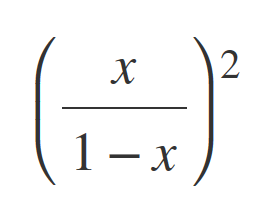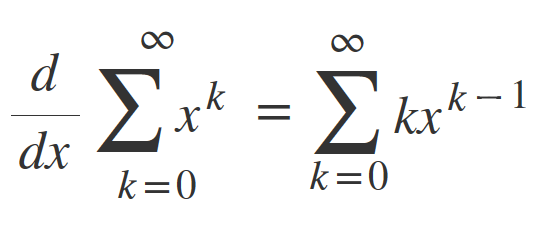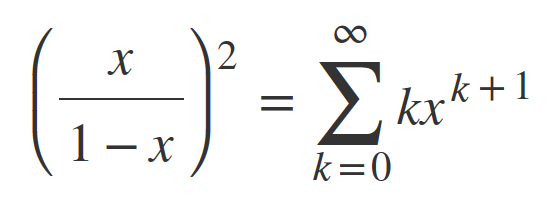Math126, Taylor series
18 March, 2019
For Math126 we were talking about the Taylor series for

It looks difficult at first glance, but it is actually quite simple. Let me explain:
Using this as a base:

The derivative of this term is:

Which gets to:

Now move the nominator in the sum to get the solution:

Time for a small PowerShell script for the Taylor series:
function f([double]$x)
{
[Math]::Pow($x/(1-$x), 2)
}
function T([double]$x, [int]$k)
{
0..$k | % { $sum = 0 } { $sum += $_ * [Math]::Pow($x, $_ + 1) } { $sum }
}
[int]$K = 16
for([int]$xi = -5; $xi -le 5; $xi += 1)
{
[double]$x = $xi / 10
[PSCustomObject]@{
'x' = $x
'f(x)' = f $x
'T(x)' = T $x $K
}
}
x f(x) T(x)
- ---- ----
-0,5 0,111111111111111 0,111068725585938
-0,4 0,0816326530612245 0,0816318326348185
-0,3 0,0532544378698225 0,0532544328723274
-0,2 0,0277777777777778 0,0277777777741005
-0,1 0,00826446280991736 0,00826446280991734
0 0 0
0,1 0,0123456790123457 0,0123456790123457
0,2 0,0625 0,0624999999943475
0,3 0,183673469387755 0,183673459741776
0,4 0,444444444444445 0,444442421037629
0,5 1 0,999862670898438
The convergence is | x | < 1
T15 is used for this test.
k Tk(x)
- -----
0 0
1 0,25
2 0,5
3 0,6875
4 0,8125
5 0,890625
6 0,9375
7 0,96484375
8 0,98046875
9 0,9892578125
10 0,994140625
11 0,996826171875
12 0,998291015625
13 0,99908447265625
14 0,99951171875
15 0,999740600585938